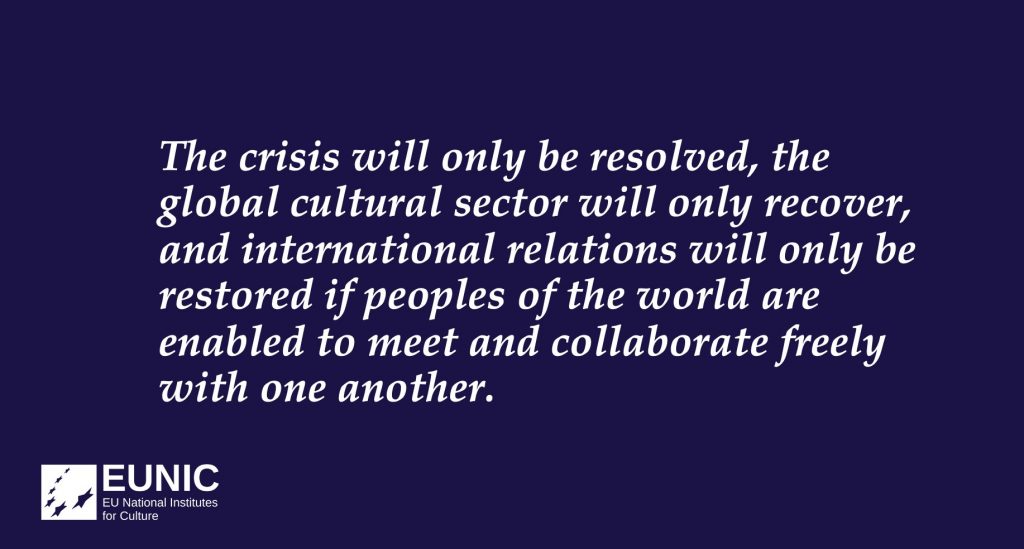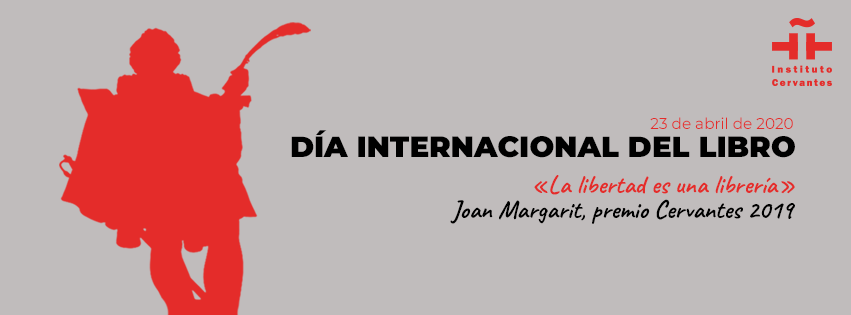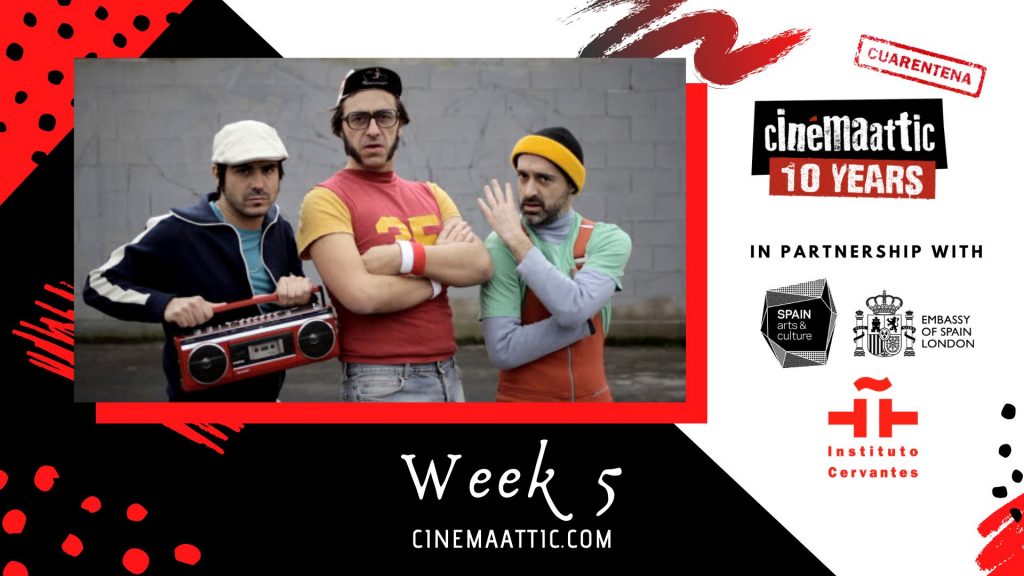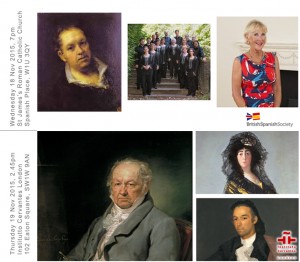For the future: Make cultural relations count in a post-crisis global society

The Covid-19 pandemic has a crushing effect on the work of international cultural relations. Activities and collaborations worldwide are cancelled or postponed, while most cultural venues are forced to close their doors. Artists and organisations, including our members, are severely affected by the abrupt discontinuation of their activities, which rely so heavily on people coming together to collaborate across borders. Actors in the field moved to the digital realm as an initial response, but how to go forward in the longer term? How can we ensure that, after this crisis, cultural relations continue to bring trust and understanding between the people of Europe and the wider world?
- Covid-19 effects on cultural relations work
In order to get an overview of the situation confronting international cultural relations, EUNIC is documenting and analysing the impact of the crisis on its members. Some major findings:
- An estimated 6.6 million euros of income was lost by EUNIC members due to branches closing.
- 85% of members temporarily closed at least half of their branches worldwide.
- Almost half were forced to cancel contracts with artists and experts.
- More than half foresee discontinuing or downsizing programmes.
- 13% are concerned about staff downsizing.
- Of those members who had to resort to new ways of gathering income, 40% have started to charge for their cultural offerings and 30% have applied for private funding.
- 85% of members are not eligible to apply for emergency government funding.
National, regional and local governments and other actors have taken important measures to mitigate the crisis and The European Commission has launched the Creatives Unite platform to gather such initiatives. We join a chorus of networks, organisations and individuals across Europe who have flagged the dire situation of culture in this crisis, calling for strong responses in support of the sector (e.g. Culture Action Europe, ECF, Europa Nostra, Members of the European Parliament, and many more).
However, many EU countries are focusing only on a response at national level, leaving behind our joint European and global responsibility. Barriers currently raised for public health reasons should not remain the norm. Now is no longer the time for countries to look inwards.
The crisis will only be resolved, the global cultural sector will only recover, and international relations will only be restored if peoples of the world are enabled to meet and collaborate freely with one another.

2. The importance of international cultural relations
Cultural relations generate a spirit of dialogue and global solidarity. Cultural relations can be at the heart of the solution to remain connected, resilient and in good mental health in the current situation. In the face of a truly global challenge, this is more important than ever. Cultural relations strengthen the idea of a shared Europe, increasing its self-reflection towards a common awareness of joint values.
Cultural relations are key in creating trust and understanding and a more peaceful world by bringing people together on a global scale. Cultural relations have played an important role in fostering peaceful relations between the peoples of the world. With all EU Member States dedicating a considerable amount of their budgets to cultural relations (EUR 2.9 billion in 2019), maintaining world spanning networks of cultural institutes (more than 2,500 branches with more than 35,000 staff), cultural relations have been over decades a prominent tool in foreign policy.
While cultural participation improves health and well-being, cultural relations can positively impact conflict resolution, peace building, and related policy development. Research has demonstrated that cultural access is the second most important determinant of psychological well-being.
Culture creates jobs and competitiveness and can play an important role in the global economic recovery. EU cultural employment is today at 8.7 million, making the sector one of the largest employers and providing jobs for 2.5 times more Europeans than the automotive sector. There is a EUR 8.7 billion trade surplus in cultural goods, and cultural and creative sectors are estimated to contribute 4.2% to EU gross domestic product (EU Agenda for Culture, 2018).
The global economy is driven by cultural creativity, innovation and access to knowledge. Cultural and creative industries represent around 3% of the global GDP and 30 million jobs (UNESCO, 2016). While global trade in creative products has more than doubled between 2002 and 2015, growing at a rate of 7% annually, mutual capacity building and the strengthening of the cultural and creative industries stimulate jobs, empowering youth and women to contribute to resilient economies (UNCTAD, 2019).
3. Ways forward
To counter the isolation of national cultural policies, transnational initiatives connecting artists and professionals across borders are being called for so that cultural exchange and intercultural dialogue can flourish.
To continue peace building, reaching out to people worldwide through culture is needed. As HR/VP Josep Borrell said on the World Day for Cultural Diversity for Dialogue and Development, “three-quarters of the world’s major conflicts have a cultural dimension. Bridging the gap between cultures is urgent and necessary for peace, stability and development.”
Local cultural sectors worldwide require support. Many countries are not in a position to devote additional resources to the cultural sectors. Here the EU can stride ahead and develop, together with authorities and organisations in partner countries, support schemes that help.
International mobility must not stop. Whereas questioning our traveling habits and reducing them for the sake of the environment is absolutely necessary, our friendly relations with the world depend on people meeting. Only by learning about each other can we develop trust and shed our fears and prejudices.
Our project “European Spaces of Culture” tests new ways of engaging in cultural relations and should be enlarged. The models found here can serve as way out of the crisis, starting a new kind of doing culture in the future – fair, equal, based on mutual listening and learning, co-creation and a bottom-up approach.
We must adapt our way of working in the digital realm, finding new, hybrid ways of doing cultural relations beyond the crisis. As the need for face-to-face meetings will remain permanent, 81% of EUNIC members are looking at developing hybrid formats that combine physical presence with virtual content. And while we are exploring digital means, we must leave no one behind. Communities without digital infrastructure must also be included in the programmes we develop to bring people together.
Cultural heritage is important for Europeans, as it is for the people from other continents. 71% of Europeans agree that “living close to places related to Europe’s cultural heritage can improve quality of life” (Eurobarometer 466). Working on cultural heritage in the framework of cultural relations can be a steppingstone to bring people together and start an honest and meaningful discourse with communities in partner countries about our past and responsibilities.
Cultural relations can play an important role in the global economic recovery. Creating cultural goods and engaging in culture does create a significant amount of jobs – jobs that bring value, empathy, peace and a sense of belonging to communities. Investing in culture together with our partners is the right thing to do now to emerge from this crisis as unscathed as possible.
4. What we must do now
“Culture is at the heart of progress: it can play a truly key role in the aftermath of the current crisis.” Along with this joint statement by HR/VP Josep Borrell and Commissioner Mariya Gabriel published on 21 May 2020, we must seize the opportunity to put cultural relations at the core of our efforts to combat the rippling effects of the coronavirus outbreak. As culture has proven to be essential in sustaining our societies in moments of crisis, culture must be protected from budget cuts in the post-crisis financial frameworks and EU budgets for culture must be substantially increased.
Therefore, we call on all actors in cultural relations to:
- Install measures so that culture is enabled to connect people worldwide, share values to improve international relations and learn from each other’s practice – including supporting EUNIC members
- Look beyond national borders and join efforts multilaterally to manage the crisis
- Demonstrate the power of effective cooperation in meeting the global challenges of our time, including better coordination of all EU activities in cultural relations
- Invest more in a joint EU foreign policy that includes an appropriate role for cultural relations
- Strengthen the organisational and financial set-up in the EU, including the European Commission and the European External Action Service, to engage in culture
- Continue investing in European cultural cooperation, resist cutting budgets for networks, co-capacity building and cultural relations activities on the ground
- Support multilateral initiatives under the EU strategic approach for international cultural relations
- Continue investing in culture within development cooperation programmes
- Strengthen the international component of Creative Europe
- Strengthen and continue existing initiatives such as “European Spaces of Culture” that can contribute to the overcoming of the crisis
- Make support to local cultural scenes worldwide a priority
- Engage in digital and hybrid ways to work in cultural relations
- Learn from each other’s current and future practice by a bottom-up process
Together, EUNIC and its members are ready to do their part.
Instituto Cervantes in London celebrates World Book Day with the reading of ‘10 Poems of Love and A Confined Song’

Instituto Cervantes in London joins the World Book Day celebrations with a reading of ’10 Poems of Love and A Confined Song’ by founder and Artistic Director of the Cervantes Theatre, Jorge de Juan. He will be joined by singer María de Juan and the event joins the list of celebrations for the 2020 Cervantine Week. It will be a week of multiple online initiatives based on all aspects of culture from books, libraries and bookstores to the publishing world, and it is open to everyone to join in and celebrate.
Having just released their new album ‘24/7’, Jorge de Juan and María de Juan come together tonight from their current locations of London and Granada, respectively. Jorge will read poems by Alfonsina Storni, Pablo Neruda, Carmen Conde, Joan Margarit and Luis García Montero among others, whilst María will sing a poem by Mario Benedetti accompanied (from Seville), by Andrés Barrios – pianist and composer who fuses world music in combination, such as flamenco and jazz. In addition, the video transmission will include photos of the journalist Jorge Pastor Sánchez, taken in Granada under the state of alarm in March 2020. The Cervantes Theatre, in collaboration with the Instituto Cervantes in London, hosts this soirée as a message of love and unity during this global pandemic.
The director of Instituto Cervantes in London, Ignacio Peyró, underlined the importance of celebrating World Book Day and Sant Jordi: “Normally on a day like today, we would be giving roses and books at our centre and celebrating reading, literature and ‘The Quixote’. This year is different, but we have made an extraordinary effort so that, although they are not face-to-face and even though they are more modest this year, our cultural activities continue to have variety and quality. In other words, they offer new, relevant and curated content by us”.

2020 Cervantine Week
Instituto Cervantes offers multiple cultural initiatives open to the public in the framework of the celebration of World Book Day, today April 23rd. With meetings with writers such as Lorenzo Silva, Elvira Lindo and Isabel Coixet, free audiobooks, the opinions and talks of more than 70 outstanding professionals in the world of culture and readings of passages from ‘Don Quixote’, among others.
The range of online projects offered today is epitomised by the verse title of the 2019 Cervantes Award winner, Joan Margarit: ‘Freedom is a bookstore’. The Cervantine Week aims to bring home, at this stage of confinement, the best of our book culture as well as promote reading and the celebration of authors, publishers and booksellers.
Even though the Instituto Cervantes in London was forced to close in response to the British government guidelines on COVID-19, our mission and cultural programmes continue online.

The Best Spanish Short Films with CinemaAttic
Every Monday, CinemaAttic and Instituto Cervantes in London, Manchester and Leeds share a weekly programme of ‘Seven Essential Short Films of the Last Decade of Spanish Cinema’. The whole thing is entirely free and accessible with English subtitles. The program is available until Sunday on both the CinemaAttic website and the Facebook event where you can also vote for your favourite shorts and comment. In addition, every Sunday at 1pm, we end the week together with ‘A Vermouth with CinemaAttic’: an online event on Facebook where a selection of the short films’ directors are interviewed.

Visual Arts: Amalgama 2020 Program
Amalgama is the first cultural initiative dedicated to promoting the work of Ibero-American female artists in the United Kingdom and will run from April to June. Amalgama, in collaboration with Instituto Cervantes in London, proposes a series of videos to present its 2020-2021 programme.
Amalgama aims to strengthen the relationship between the British public and the international art scene regarding the work of female artists from Latin America, Spain and Portugal. This year’s programme will include two exhibitions (a group show and a solo exhibition) displaying the artists’ research on the tension between nature and culture in the digital age.
The exhibitions include 15 artists, ranging from Argentina, Brazil, Chile, Colombia, Spain, Portugal and Venezuela. Each artist included in the final product was specially selected from the 190 applicants in an open call. For the second show, Amalgama will present the work of renowned Colombian artist Maria Elvira Escallon who was nominated for the Luis Caballero Prize in 2019.

Spanish Cinema Snippets with Joana Granero
Also available are a series of short introductions to Spanish cinema. They include presentations across a wide array of subjects, hosted by Joana Granero, Director and Founder of the London Spanish Film Festival. Each one focuses on a specific new or archival film on the work and career of leading names in Spanish cinema as well as artistic movements and schools.
In session one, Granero talks about José Luis Cuerda; filmmaker, screenwriter and producer. In session two, she will talk about a successful case: ESCAC. ESCAC, Escola Superior de Cinema i Audiovisuals de Catalunya, where teamwork and crossing barriers are primary guidelines. They have produced some of the most interesting and fresh productions over the last few years.

Literary podcasts with The Eye of Hispanic American Culture
April’s literary podcasts are produced by The Eye of Hispanic American Culture and led by Enrique Záttara who is responsible for the project. They include central figures such as the Spanish poet, professor and director of Instituto Cervantes, Luis García Montero and the Argentine novelist Mariana Enríquez.
The Eye of Hispanic American Culture is a multimedia, international and bilingual cultural project, based in London. Its objective is to promote the Hispanic-American culture residing in Europe and across the globe by connecting and informing artists, writers and intellectuals.

Great Spanish and Ibero-American composers season
Additionally, the Iberian & Latin American Music Society (ILAMS) and Instituto Cervantes in London present a series of podcasts which bring the life and work of the most representative Spanish and Ibero-American composers to life. The podcasts are released on a monthly basis and celebrate the rich musical tradition of our countries.
Ray Picot, concert reviewer at ILAMS and writer of a popular monthly column for Echoes Magazine, will focus on the masterpieces of Enrique Granados, who was one of a triumvirate of great Spanish composers to achieve international acclaim during the early 20th century.
Doble dosis de Goya el 18 y 19 de noviembre de 2015 / Double bill of Goya on 18 and 19 November 2015
La próxima semana Londres tendrá a su disposición una maravillosa doble dosis de la vida y trabajo de Goya: el miércoles 18, The British Spanish Society presenta una perspectiva única sobre el artista aragonés con el Coro Cervantes y la Dra. J. Cockburn. El jueves 19, nosotros acogemos un simposio sobre los retratos de Goya en nuestro auditorio.
______________________________
Next week London will have at its disposal a wonderful double bill of Goya’s life and work: Next Wednesday 18th, The British Spanish Society presents a unique take on the renowned Aragonese artist featuring Coro Cervantes and Dr. Jacqueline Cockburn. The very next day (Thu 19th), we are hosting a symposium on Goya’s portraits.



